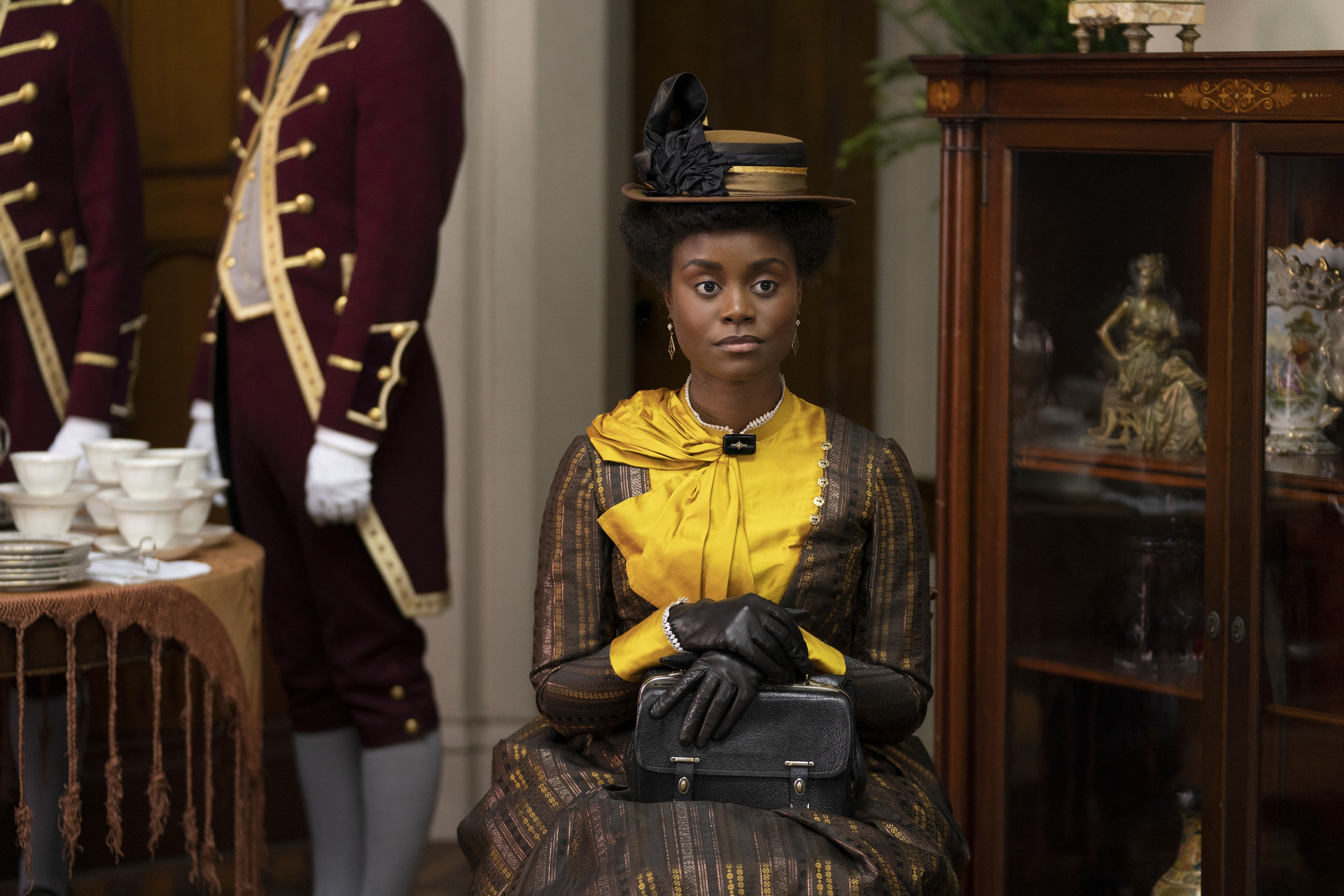
To recap any show, we tend to watch the episode more than once in order to get all the details and quotes right. When Agnes van Rhijn stormed out of her house to confront Bertha Russell for the first time, we blurted out two different things each time we watched the episode. The first time, we yelled, “She’s out on the street without her hat on!” The second time we watched it we noted, “Man, the plotting here was actually really well done.” Unfortunately, for all the great work setting up how Mrs. Russell’s luncheon went down, the payoff just didn’t happen in the way it probably should have. But we’re getting ahead of ourselves, of course.
George and Bertha pose for pictures at the train crash site in Pennsylvania. Clara Barton is there and George gives her a massive check. All of this runs in the paper the next day so that Agnes can get her daily sneer on. She calls it negligence on George’s part. Marion, because she’s Marion, immediately takes the opposite position. “He’s the captain, isn’t he?” Agnes asks. “Or doesn’t an officer take responsibility in that class.” We’re not sure why Marion tries her best to rise to the defense of a railroad baron except perhaps to illustrate how terrible her instincts are.
Marion and Peggy go to Aurora Fane’s house for a tempestuous Red Cross meeting, featuring a collection of absurd hats. To be blunt, we find it impossible to believe that a bunch of old money society matrons in 1882 would sit in the same room with a Black woman – in one of their own homes, no less. Maybe they were distracted by Ann Morris spewing invective all over the room about Bertha. Clara Barton tries to dismiss it as a “society squabble,” to which Ann spits “It’s not a society squabble because Mrs. Russell is not in society.” Once again, Bertha saunters in and asks “You bitches talking about me again?” Or something to that effect. Clara Barton shames the ladies into admitting Bertha to the board. Ann Morris takes the news well. “What a sad and vulgar world we live in.” Clara Barton yells “Bitch, we’re not planning your daughter’s coming out here. Sit the hell down.” Or something like that. Peggy sits in the back with a shit-eating grin watching all these white ladies making asses of themselves. After Mrs. Morris storms out, Clara Barton suggests everyone have a cup of coffee, because caffeine is what’s really needed here. While the society ladies try to figure out how to make the Keurig work, Clara prevails upon Marion to go and check in on Mrs. Chamberlain. We’re starting to think Miss Barton is secretly enjoying fucking with all of these old money ladies. Later, Aurora takes Bertha aside to tell her (discreetly, her eyes darting around the room) that Ward McCallister wants to be invited to luncheon at her palace. Once again, something akin to a human emotion rises up in Bertha. Aurora warns her that “the service must be English. He uses it to frighten newcomers.”
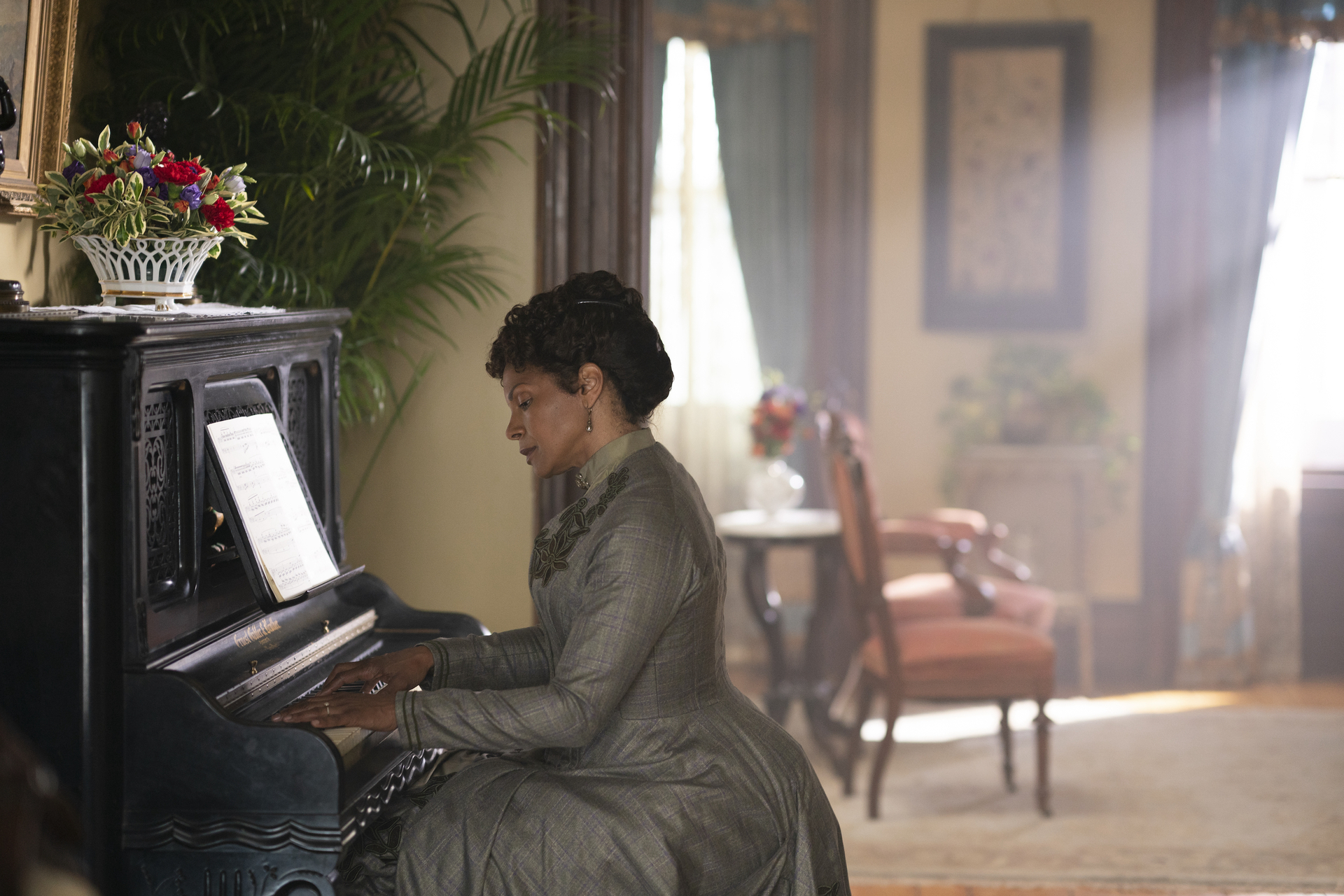
Outside the Fane house, Marion is introduced to two of the most essential truisms of American history: 1. White people are racist, and 2. It’s nearly impossible to hail a cab in Manhattan. She is aghast. Peggy rolls her eyes. “What was the point of that?” she asks dismissively of Marion’s little tantrum. “You’ve just discovered injustice. I’ve lived with it my whole life.” We don’t think it’s a coincidence that the best-written character on the show is a Black woman after Julian Fellowes made the smart choice to partner with writer and executive producer Sonja Warfield. In retrospect, he would have been incredibly dumb not to bring a Black American writer and E.P. onto this project, given how little experience he has with writing Black characters, let alone Americans. Peggy goes off to meet with Mr. Fortune at the Globe and finds out that her story was so well-received it increased the paper’s circulation. Somehow, she manages to swing by her parents’ place in Brooklyn unannounced (which would not have been all that easy a trip to make on a whim), which gives Audra McDonald another chance to grace our screen. They have yet another conversation about how they have to get through… whatever it is they have to get through.
George is very upset and grief-stricken. We know this because he says “I am grief-stricken.” He follows that up by noting, “We’re not too badly damaged on the market, I’m glad to say.” After expressing happiness that he remains rich, he goes home to yell at Bertha for not being appropriately sad. Anyway, it seems someone something substandard axles blah-blah. The upshot is that George Russell the railroad baron is very upset and has a high moral code and none of this is his fault. It’s all a little silly. Bertha coldly notes that they have to try and manage the damage to their social standing and George acts offended by it. He says he doesn’t give a rat’s ass about Ward McCallister. She changes the subject to the late, lamented Archie Baldwin. Once again, George is appalled that she’s reading Gladys’ mail. “If you go soft on me now, we could lose everything we’ve worked for,” she says, as if they were planning a heist. Once again, he throws the train accident at her like it was her fault. He goes to Gladys to more or less apologize for sending her beau away. Gladys sneers that despite all his success and power, he can’t stand up to his wife. Things are incredibly rocky on every floor of the Russell household and it sure feels like Bertha’s heading for some sort of disaster, given all the signs.
Mrs. Bruce, who is showing herself to be quite the manipulator, goes to Bertha and suggests that she ask Bannister to come over and supervise Mr. Church, who seems offended by the idea that he has to serve English style. We suppose it was the right call, because Church really did appear a bit over his head on this one, but Bertha pretty much humiliated him in the process, which is really not something the mistress of a household should be doing to her butler if she wants to maintain control of her household.
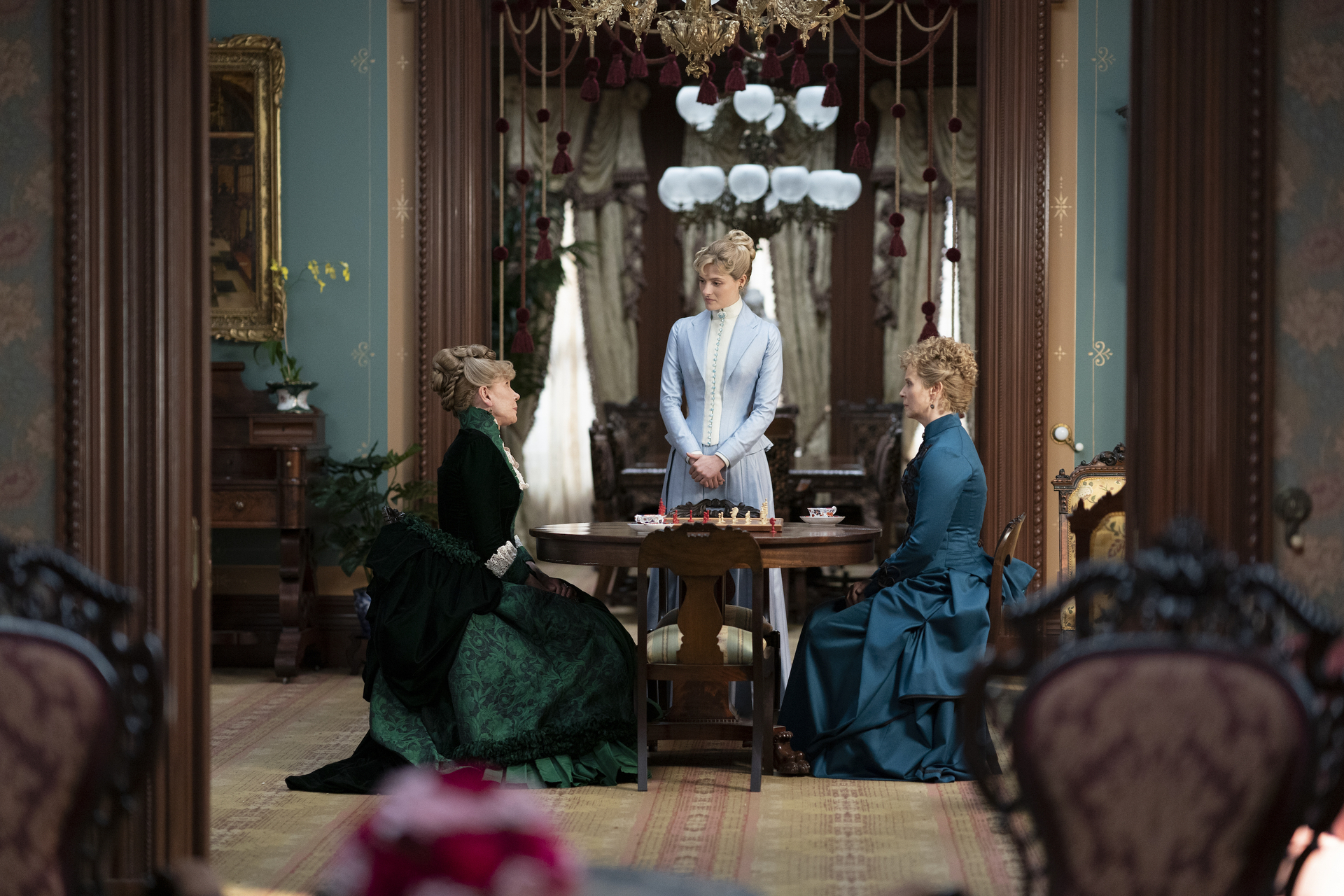
Across the street, Agnes gets in another round of sneering. “These people. You shut the door, they come in the window. You shut the window, they come down the chimney.” No one is actually trying to get into Agnes’s house, though. She’s simply aghast that Marian accepted Bertha’s luncheon invitation. She’s further aghast when she finds out Mr. Raikes will be at the luncheon. “He won’t need you much longer,” she sneers. Marion stomps out. This is all setup for the two actions Marion takes next, both of which are born out of her frustration with Agnes.
She goes to visit Mrs. Chamberlain at Clara Barton’s request and runs into Larry Russell coming out of Stanford White’s office. He asks her to keep his secret that he’s looking to change careers and go into architecture. Marion seems a little pleased to secure another alliance and tells him how much she envies his freedom. Peggy notes that she sure does manage to snag the attention of a lot of pretty men. We have no doubt this will play out in some way soon. Mrs. Chamberlain receives her for tea and calls her pure for thinking the Red Cross board would ever let her sit on it, no matter how large her donation. Mrs. Chamberlain admits that the stories about her are true. She was “with” her husband while he was married to someone else. “I broke the rules.” Marion admits that she wants to do the same by running into Tom Raikes’ arms. Mrs. Chamberlain is surprisingly sympathetic to Marion’s aunts and reminds her that they know “a great deal about how this city works.” She proposes inviting Mr. Raikes over and letting the two of them more or less court in her parlor. We can’t imagine this isn’t going to give Agnes a rage stroke when she finds out.
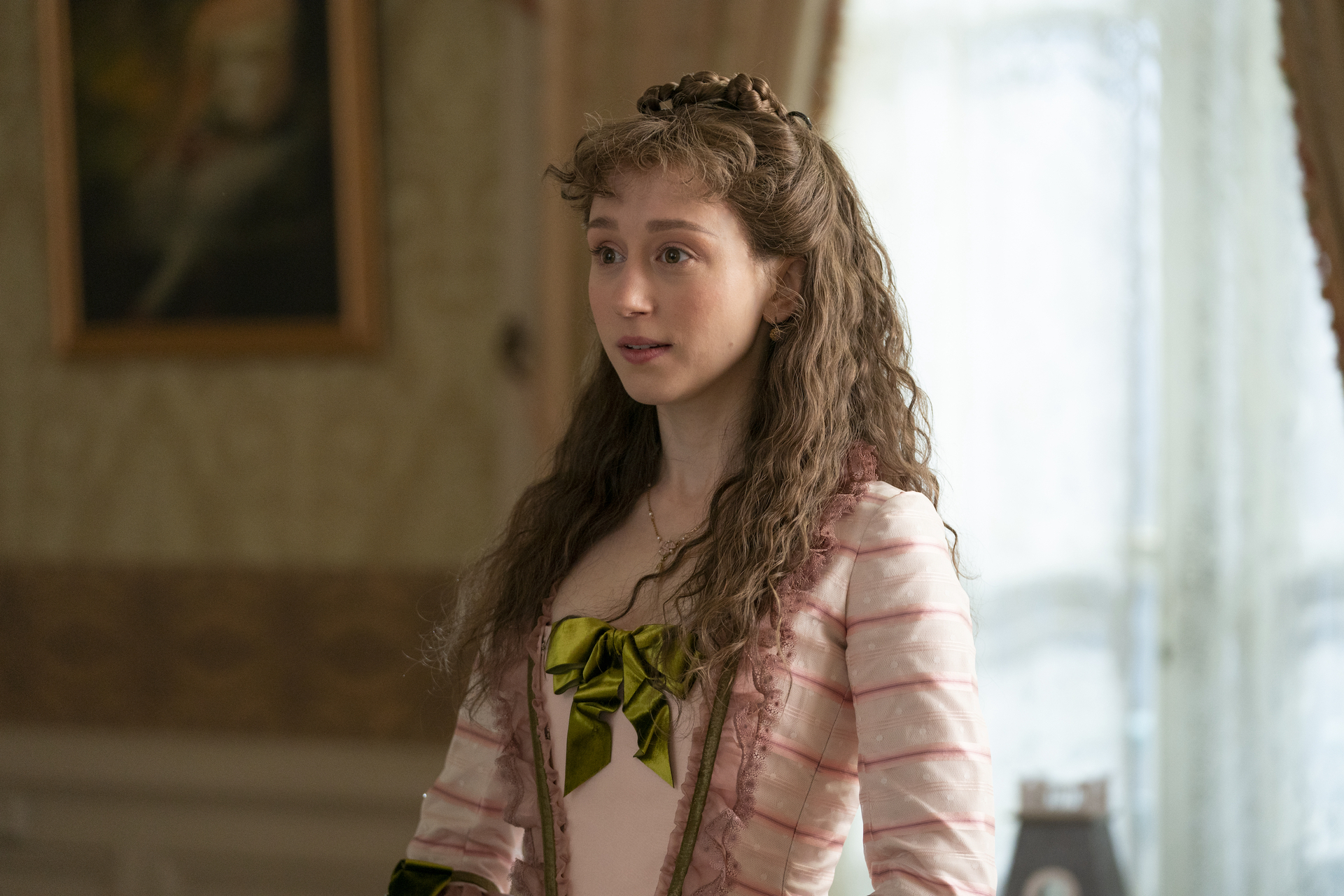
Mamie Fish throws a doll tea party and it’s exactly as weird as it sounds. Gladys was allowed to go with Larry because Bertha lit up at the news that Carrie Astor would be there. Gladys instantly and easily befriends Carrie at the party and they bond over the shared experience of having overbearing mothers. Later, Carrie pays her a visit, which delights Bertha so much that she starts hinting at the coming out she’s been putting off for so long. This little alliance was a fun one to watch play out, but we would have liked it more if Gladys had been shown to be a little shrewd and deliberate about it. Besting her mother at her own ambitions would be a fabulous thing to watch. There’s clearly some parallels between Gladys making a strategic alliance and Marion making several at the same time, each in defiance of or in spite of their mother figures. This is what we mean when we note that the writing has been very good about setting certain things up, but not particularly great about exploring the implications.
Mrs. Russell’s nearly disastrous luncheon was a perfect example of this. The idea of English service being used by the old money people was brought into the story all the way back when Pumpkin slipped her leash and was found by the Russell household staff, prompting a visit by Bannister, who asked for a tour of the house and made several passive-aggressive comments about how things are done. We’ve seen how Mrs. Bruce is good at manipulating the house. We’ve seen how Church is offended by Bertha’s disregard. We know she can’t control her servants. All of this was rather meticulously laid out over the course of several episodes and we applaud that. We just hated how it played out.
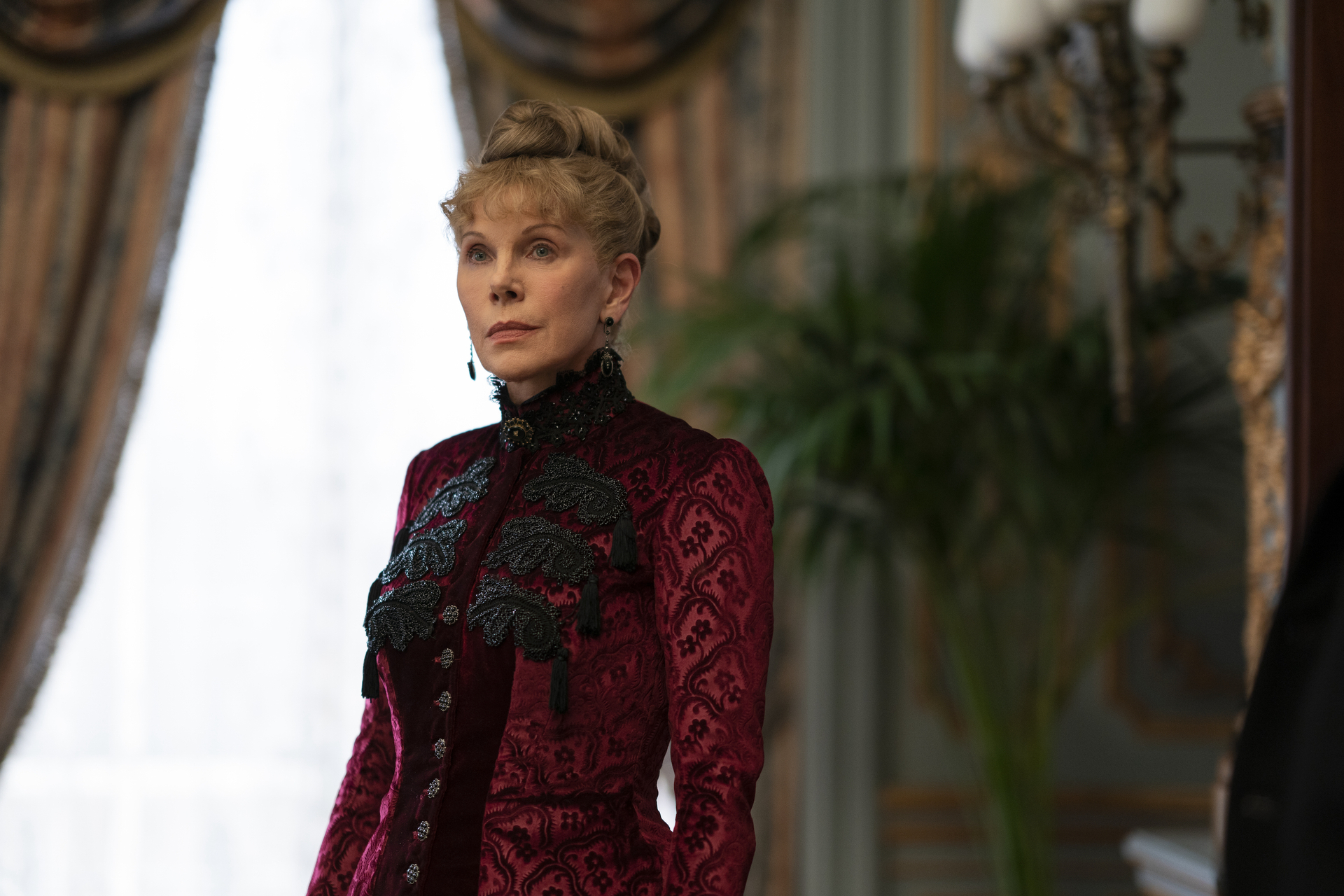
Here’s the thing about Bannister’s big betrayal: It was a fun story, but nothing about it made any sense. First, it turns the formerly very proper Bannister into something of a hustler willing to put his livelihood at risk and seriously offend his employer. We are meant to believe that he would not only risk his employment with Mrs. van Rhijn by lying to her, but it also means that we’re to believe he would rope some of the household staff into this lie. We also have to believe that Agnes’ niece Aurora Fane wouldn’t recognize her aunt’s butler as easily as Marion did. It was an extremely well-plotted development, but almost none of the character reactions made sense. We can believe that Agnes would be so blind with rage that she would storm into a luncheon uninvited and we can believe that propriety and embarrassment would force her to leave without making a scene. We just don’t believe that Bannister would have a job after this, nor do we accept Agnes’s sudden defeated attitude. Are we to accept that she was so overwhelmed by the grandeur of the Russell house that it left her feeling small? When literally every scene she’s been in has shown her to be revolted by how vulgar she finds it? When Armstrong tried to stir up a little trouble about Peggy, Agnes slapped her down so coolly and efficiently that it left a handprint on her face. “If you continue to try to make trouble for Miss Scott, I will be angry. You are warned.” We’re supposed to believe that person went home to a household staff who lied to her and caused her probably the greatest embarrassment she’s suffered in decades, only to mope in front of her mirror?
Armstrong causing further trouble by revealing Oscar’s alliance with Turner was yet another example of good plotting, even if it made poor character sense. “What is Bannister to this?” Agnes asks indignantly, evidently dispensing with the idea that repercussions are going to play out in any sort of manner that would make sense. Despite Agnes’ threat that gives this episode its title, it doesn’t appear like heads are going to roll at all. Having said that, we are here for the Bannister-Church war to come.
OUTLANDER Star Sam Heughan for MEN’S HEALTH Magazine Next Post:
THE DROPOUT Star Amanda Seyfried in Oscar de la Renta on LATE NIGHT WITH SETH MEYERS
Please review our Community Guidelines before posting a comment. Thank you!



